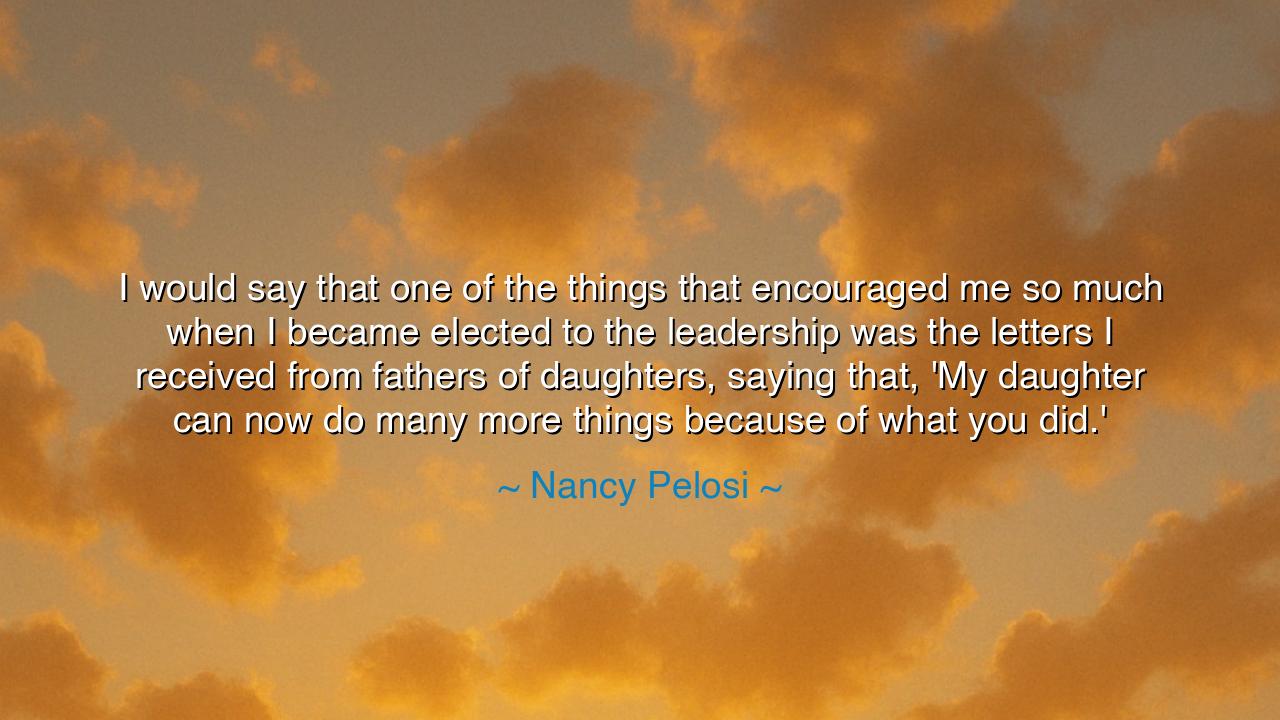
I would say that one of the things that encouraged me so much
I would say that one of the things that encouraged me so much when I became elected to the leadership was the letters I received from fathers of daughters, saying that, 'My daughter can now do many more things because of what you did.'






Hear the words of Nancy Pelosi, a woman who broke barriers and carried the mantle of authority, who proclaimed: “I would say that one of the things that encouraged me so much when I became elected to the leadership was the letters I received from fathers of daughters, saying that, ‘My daughter can now do many more things because of what you did.’” In this statement echoes not only personal triumph, but the timeless truth that when one soul ascends, countless others find the path widened. True leadership is not measured only in laws written or titles gained, but in the horizons it opens for those who once thought the way closed.
The ancients knew that symbols are as powerful as deeds. When a warrior lifts his shield against overwhelming odds, it is not only his own life he defends, but the courage of all who see him. So too with Pelosi’s words: her election was not hers alone. It became a beacon, proof that what was thought impossible could now be reached. And fathers, seeing this light, turned to their daughters and said, “Now it is possible for you also.” Thus, the circle of courage expanded—not by decree, but by example.
History shines with similar moments. When Marie Curie won the Nobel Prize, she did more than advance science; she shattered the belief that women had no place in its pursuit. Her victory was not hers alone, but a key that unlocked doors for generations of daughters who would dare to study, experiment, and discover. Like Pelosi, she became a living testimony that barriers are not eternal, that every breakthrough sends ripples through time, enlarging the realm of what is possible.
Yet Pelosi’s words remind us also of the unseen power of encouragement. It is easy to see leadership as the work of laws, battles, or commands. But leadership is also the quiet transformation of hearts—the father who now believes in his daughter, the daughter who now believes in herself. A single voice at the top can change a million conversations at the hearth. This is how societies shift: not only through revolutions, but through the slow, steady widening of belief in what can be done.
But let none think this path is easy. To be the first, to stand where few or none have stood, is to bear the weight of doubt, resistance, and trial. Yet from this weight comes greatness, for the leader does not carry it for herself alone—she carries it for all who follow. This is why her victory matters. When she endures the storm, others may walk in sunlight. When she scales the cliff, others may find the path worn smoother beneath their feet.
The meaning of Pelosi’s quote is therefore profound: leadership is not only about governing the present, but about shaping the future of possibility. It is about living in such a way that others, especially the young, can look up and say, “If she can, then I too can.” It is about showing fathers that their daughters need not be confined by the chains of tradition, and showing daughters that their strength is as vast as the sky.
The lesson, then, is this: strive not only for your own advancement, but for the unseen eyes watching you, the generations yet to come. When you act with courage, you do not stand alone—you open doors for others. Encourage the young, especially those told they cannot, and remind them that their limits are not fixed. In your family, in your work, in your community, become the living proof that barriers can be broken. For when you do, you may one day hear, as Pelosi did, that a child has dared to dream more greatly because of your path. And there is no greater gift of leadership than this.






AAdministratorAdministrator
Welcome, honored guests. Please leave a comment, we will respond soon